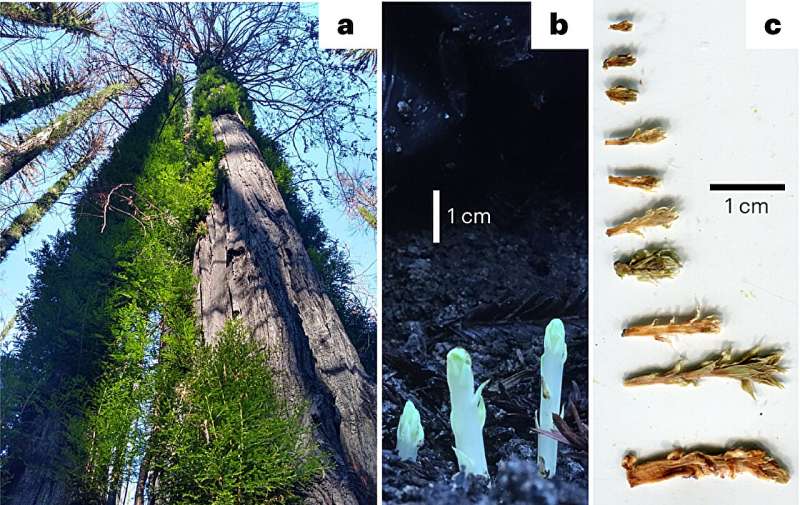This article has been reviewed according to Science X's editorial process and policies. Editors have highlighted the following attributes while ensuring the content's credibility:
fact-checked
peer-reviewed publication
trusted source
proofread
New study offers cautious hope about the resilience of redwoods

New research from Northern Arizona University has explained coast redwood's remarkable ability to recover from very severe fire, a rare sign of optimism amid a landscape increasingly scarred by severe fires.
The study, published today in Nature Plants, examined recovery after the catastrophic CZU Lightning Complex Fire, which began in August 2020 and burned thousands of acres of redwoods in Big Basin State Park in California, some more than 1,500 years old.
Researchers from NAU's Center for Ecosystem Science and Society (Ecoss) and the School of Informatics, Computing, and Cyber Systems (SICCS) found, however, that many trees were not dead, as they first appeared. Redwoods store massive quantities of carbon reserves, and these reserves fueled growth of new leaves. These leaves sprouted from buried buds that had been dormant for centuries, helping the forest to begin regenerating.
"It remains to be determined if redwood's old reserves and ancient cell lines are an exception in the plant kingdom or an exceptional example of an insurance strategy common to long-lived plants," said George Koch, professor in Ecoss and co-author of the study.
Plants store carbon, and many do it for some length of time. Most models looking at these reserves, however, look at a storage period no longer than a year. For a two-millennia-old tree, that doesn't work. This study modeled how long such reserves could be saved for future use. The researchers inhibited photosynthesis to keep out new carbon and used radiocarbon dating to infer how old the carbon being put to use was. The models suggested that in a few trees, carbon reserves were likely decades—maybe even a century—old.
The team's updated models showed that the redwoods' reserves included carbon captured 50 to 100 years ago. "As far as we know, these are some of the oldest carbon reserves ever measured," said Drew Peltier, assistant research professor in SICCS and lead author of the study.
"Sugars photosynthesized perhaps 100 years ago were used to grow new leaves in 2021. Although coast redwood is clearly a superlative species, it is likely that other long-lived trees also harbor carbon reserves that are much older than previously recognized."
"This study was really exciting for us because we used measurements at the atomic level—counting the amount of carbon-14 relative to carbon-12—to understand what these sprouts, which start as tiny green shoots, are telling us about the growth strategy of these enormous trees, among the largest living organisms on earth," said Regents' professor Andrew Richardson, a co-author on the paper.
It's not all good news; many redwoods and trees of other species at Big Basin did not survive the fire. So, although coast redwood is exceptional in its resprouting capacity, it may be centuries until the forest ecosystem at Big Basin has fully recovered.
The other co-authors of the study from NAU are assistant research professor Mariah Carbone; graduate student Melissa Enright and Jim LeMoine.
More information: Drew M. P. Peltier et al, Old reserves and ancient buds fuel regrowth of coast redwood after catastrophic fire, Nature Plants (2023). DOI: 10.1038/s41477-023-01581-z
Journal information: Nature Plants
Provided by Northern Arizona University


















